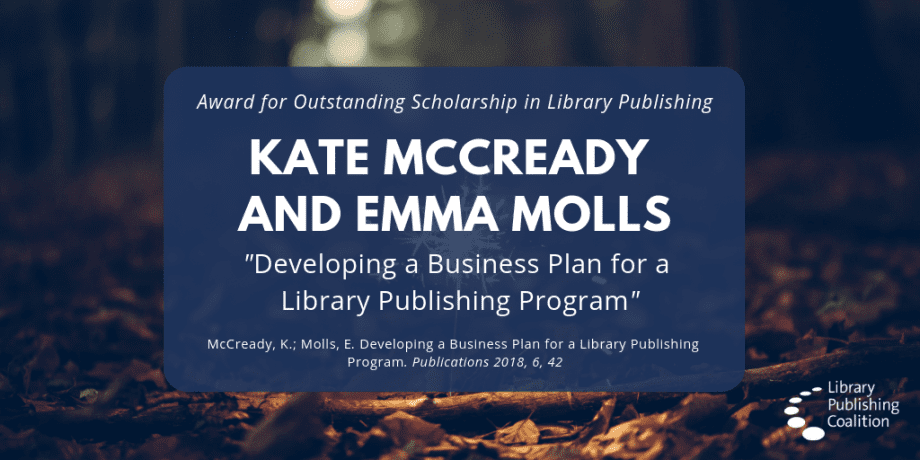April 29, 2019
By Melanie Schlosser
It’s been nine months since LPC released our very ambitious 5-year strategic plan (PDF), setting out a range of objectives in three goal areas: 1) promulgate best practices in library publishing, 2) strengthen the community of library publishers, and 3) act as a focal point and a force multiplier for library publishing. The Board is still building up our tools and processes for tracking and reporting progress on the plan, but in anticipation of the Forum where there will be opportunities for reflection and conversation we wanted to let the community know about some work that has been happening in each of these areas. This is by no means a comprehensive list, but it gives a flavor of some activities happening within the organization.
Promulgate best practices in library publishing
Training: In addition to our regular program of webinars, LPC partnered with Educopia this year to offer a number of Library Publishing Curriculum pilot workshops – in person, synchronous virtual, and asynchronous virtual – using this fantastic new resource. LPC is also in the process of taking on the long-term stewardship of the curriculum, and will be putting out a search for a Curriculum Editor-in-Chief this summer.
How-to guides: In the last year, we released two new publications – the Ethical Framework for Library Publishing and a how to guide for DOAJ Applications – to help library publishers follow best practices in their work.
Research: Library publishing is a relatively new field, and there are still plenty of areas where best practices aren’t yet known. To encourage investigation and development of these areas, LPC’s Research Committee is creating a research agenda for the field. Look for a draft for comment this summer!
Strengthen the community of library publishers
Growth in membership: LPC has welcomed 20 new member libraries in the last year! We also launched a new mentorship program to support new library publishers and new member libraries in getting the most out of the community.
Growth in outreach: We added three new strategic affiliate organizations this year (SPARC, Open Textbook Network, and Creative Commons USA) and the number of organizations sponsoring the LPC and the Library Publishing Forum continues to grow.
Growth in international engagement: While LPC’s membership is primarily North American, supporting and learning from the international community of library publishers is a priority for us. We are participating in the new Special Interest Group on Library Publishing that formed this year within the International Federation of Library Associations, and a Board subgroup is currently drafting a strategy for sustained international engagement.
Act as a focal point and a force multiplier for library publishing
Engaging with vendors: We continue to build out our Publishers and Service Providers List as a starting point for library publishers looking to outsource services. We are also working on some exploratory projects that will investigate the system and support needs of library publishers with the goal of contributing to the development of targeted solutions – stay tuned for more information.
Raising awareness about library publishing: At a variety of conferences, we have increased our capacity to engage with related communities of practice, and are regularly presenting on our work. This year, the LPC Blog has been an active platform for commentaries that explore issues important to library publishers and profiles that raise the visibility of the transformative work our members do on their campuses. We also published a scholarly article highlighting LPC’s work and the importance of library publishing.
Creating community spaces: The Library Publishing Forum serves as an important and growing venue for sharing best practices, identifying trends, and tackling thorny problems. Many groups within LPC – including the Program Committee, the Diversity and Inclusion Subcommittee, and the Board – have worked this year to grow the Forum in breadth, depth, and inclusivity, while retaining its unique character and welcoming environment.
We want to hear from you!
These achievements and the efforts that are underway indicate a very strong launch to accomplishing the goals outlined in our plan. All of this work was done by you, the LPC membership, along with our talented Educopia staff. We welcome your feedback on this work and your ideas for bringing the LPC Strategic Plan to life.




